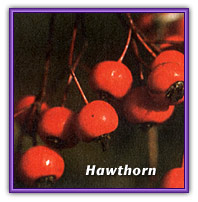 Source
Source
Hawthorn is the fruit, or the flowers and leaves combined, of several of the more than 100 species of Crataegus, a genus of the rose family found in North America, Europe, and east Asia.
In Europe, English hawthorn, C. laevigata, and oneseed hawthorn, C. monogyna are used. In Chinese medicine, C. pinnatifida is used.
Traditional Use
If closely related plants are used by cultures on opposite sides of the globe, a scientific basis for the traditional use is likely. Such is the case with hawthorns, which have been used in European, Chinese, and American traditions alike to treat heart ailments. In traditional Asian medicine as well as European herbal traditions, hawthorn has been widely used in longterm prescriptions for hypertension related to cardiac weakness, arteriosclerosis, and angina pectoris.
Hawthorn is notably absent from medical works and herbals of early-nineteenth-century America and Europe. It came to the attention of the medical profession in the 1890s by means of a single reference in a medical journal. By the early twentieth century, it was a mainstay of heart disease treatment. Still widely used in Europe and Asia, it is less frequently recommended in America.
Current Status
Medical practitioners in Europe and China use hawthorn to treat early stages of congestive heart failure characterized by diminished cardiac function, a sensation of pressure or anxiety in the heart area, age-related heart disorders which do not require digitalis, and mild arrhythmias. Numerous pharmacological and clinical studies have shown that hawthorn fruit or berry extract improves blood flow to and from the heart by strengthening its contractions. Hawthorn flower and leaf extracts improve circulation to the extremities by reducing resistance in the arteries. Experiments in China have shown that preparations of hawthorn fruit lower blood pressure and serum cholesterol levels, and are therefore useful in the prevention and treatment of arteriosclerosis.
Preparations
Preparations used in Europe are standardized to compounds called oligomeric procyanidins and flavonoids. The dried berries, leaves, and flowers are available in the American market. Standardized products may be expected to give more predictable results. The berries also make a pleasant-tasting tea. In Germany flower and leaf preparations are approved. Fruit preparations are unapproved since they are not as extensively researched as flower and leaf preparations.
Cautions
No side effects or contraindications are known from hawthorn. Any heart condition, however, is serious and should receive the attention of qualified medical practitioners. Heart disease is the number one killer in America; it should not be self-diagnosed or self-treated.
Symptoms
Angina pectoris
Congestive heart failure, early stages

![]()
![]()
![]()
 Source
Source